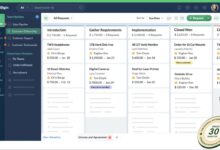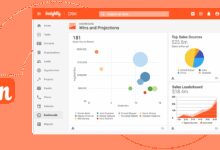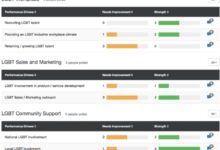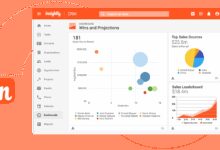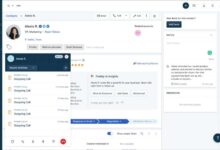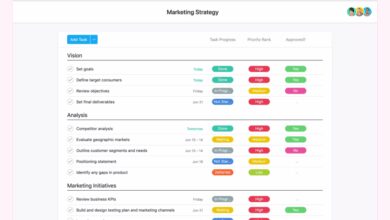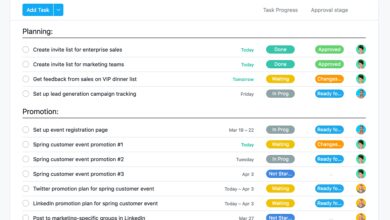Compare CRM Software for Small Business: 7 Best Options Revealed
Finding the right CRM can transform your small business. Let’s compare CRM software for small business to help you choose wisely.
Why Compare CRM Software for Small Business?

Choosing the right Customer Relationship Management (CRM) tool is one of the most strategic decisions a small business can make. As your business grows, managing customer interactions manually becomes inefficient and error-prone. A CRM system centralizes customer data, automates follow-ups, and improves sales tracking—giving you a competitive edge. But with dozens of options available, it’s essential to compare CRM software for small business to find the perfect fit.
Understanding CRM Basics
A CRM is a software platform that helps businesses manage all aspects of customer interactions. From tracking leads and managing sales pipelines to handling customer support and marketing campaigns, CRM tools streamline operations across departments. For small businesses, the right CRM can act as a virtual sales assistant, ensuring no opportunity slips through the cracks.
- CRMs store contact information, communication history, and deal stages.
- They integrate with email, calendars, and social media platforms.
- Many offer automation features like follow-up emails and task reminders.
According to Salesforce, companies using CRM systems see a 36% increase in customer satisfaction and a 34% improvement in sales performance.
Why Small Businesses Need a CRM
Small businesses often operate with limited staff and tight budgets. A CRM helps maximize efficiency by reducing manual work and improving customer engagement. Without one, teams may rely on spreadsheets or sticky notes—methods that are hard to scale and prone to data loss.
“A CRM isn’t just for big corporations. It’s a growth engine for small businesses looking to scale smarter.” — HubSpot Blog
By comparing CRM software for small business, you can identify tools that offer scalability, affordability, and ease of use—three critical factors for long-term success.
compare crm software for small business – Compare crm software for small business menjadi aspek penting yang dibahas di sini.
Key Features to Look for When You Compare CRM Software for Small Business
Not all CRMs are created equal. When you compare CRM software for small business, focus on features that align with your operational needs and growth goals. Here are the most important functionalities to evaluate.
Lead and Contact Management
This is the foundation of any CRM. Effective lead and contact management allows you to organize customer information in one place. Look for tools that let you segment contacts by industry, location, or buying stage.
- Automated data capture from emails and web forms.
- Duplicate contact merging to avoid confusion.
- Custom fields to store unique business-specific data.
For example, Zoho CRM offers AI-powered lead scoring, helping prioritize high-value prospects automatically.
Sales Pipeline Tracking
A visual sales pipeline shows where each deal stands—whether it’s in initial contact, negotiation, or closing. This transparency helps forecast revenue and identify bottlenecks.
- Drag-and-drop interface for easy deal movement.
- Customizable stages based on your sales process.
- Real-time reporting on conversion rates and average deal size.
Tools like Insightly and HubSpot CRM provide intuitive pipeline dashboards that update in real time, making it easier to manage deals without manual input.
Automation and Workflow Tools
Automation saves time and reduces human error. When you compare CRM software for small business, prioritize platforms that offer workflow automation for repetitive tasks.
compare crm software for small business – Compare crm software for small business menjadi aspek penting yang dibahas di sini.
- Automated email sequences after lead capture.
- Task assignments when a deal moves to a new stage.
- Follow-up reminders based on customer behavior.
For instance, ActiveCampaign excels in marketing automation, allowing small businesses to send personalized emails triggered by user actions—like visiting a pricing page or downloading a brochure.
Top 7 CRM Platforms to Compare for Small Business
To help you make an informed decision, we’ve analyzed the top seven CRM platforms ideal for small businesses. Each offers unique strengths, pricing models, and scalability options. Let’s dive into what makes them stand out when you compare CRM software for small business.
1. HubSpot CRM
HubSpot CRM is one of the most popular free CRM solutions for small businesses. It combines powerful features with an intuitive interface, making it ideal for startups and growing teams.
- Pros: Free forever plan, excellent integrations, user-friendly design.
- Cons: Advanced features require paid add-ons.
- Pricing: Free; paid plans start at $45/month.
HubSpot integrates seamlessly with Gmail, Outlook, and Slack, allowing users to log calls, emails, and meetings automatically. Its marketing hub also enables email campaigns, landing pages, and social media scheduling—all within the same ecosystem. Learn more at HubSpot’s official site.
2. Zoho CRM
Zoho CRM is a robust, scalable solution that grows with your business. It’s particularly strong in AI-driven insights and customization.
- Pros: AI assistant (Zia), extensive automation, mobile app.
- Cons: Interface can feel overwhelming for beginners.
- Pricing: Starts at $14/user/month (billed annually).
Zoho CRM offers industry-specific editions for retail, real estate, and education. Its AI capabilities include predictive lead scoring and sentiment analysis of customer emails. Visit Zoho CRM to explore its full suite.
compare crm software for small business – Compare crm software for small business menjadi aspek penting yang dibahas di sini.
3. Salesforce Essentials
Salesforce, a global leader in CRM, offers Essentials—a version tailored specifically for small businesses with up to 10 users.
- Pros: Powerful reporting, global support, third-party app marketplace.
- Cons: Higher price point; steeper learning curve.
- Pricing: $25/user/month.
Salesforce Essentials includes built-in email tracking, mobile access, and integration with Outlook and Gmail. It also connects to over 3,000 apps via the AppExchange. More details at Salesforce Pricing Page.
4. Freshsales (by Freshworks)
Freshsales stands out for its AI-powered sales forecasting and built-in phone system. It’s designed for sales-first small businesses.
- Pros: Built-in calling, AI-based lead scoring, clean UI.
- Cons: Limited third-party integrations compared to competitors.
- Pricing: Free plan available; paid plans from $15/user/month.
The platform includes a smart assistant that suggests next steps and predicts deal closure dates. Its visual timeline view shows all customer interactions chronologically, improving context during follow-ups.
5. Pipedrive
Pipedrive is built for sales teams that want a simple, pipeline-focused CRM. It’s ideal for small businesses whose primary goal is closing more deals.
- Pros: Intuitive drag-and-drop pipeline, strong sales automation.
- Cons: Limited marketing tools in lower tiers.
- Pricing: Starts at $14.90/user/month.
Pipedrive’s strength lies in its visual simplicity. Sales reps can easily move deals across stages, set reminders, and track performance metrics. It also offers email integration and activity reporting. Explore it at Pipedrive.com.
compare crm software for small business – Compare crm software for small business menjadi aspek penting yang dibahas di sini.
6. Insightly
Insightly combines CRM with project management, making it ideal for service-based small businesses like consultants, contractors, or agencies.
- Pros: Project tracking, relationship linking, workflow automation.
- Cons: Advanced features locked behind higher pricing tiers.
- Pricing: Starts at $29/user/month.
With Insightly, you can link contacts to projects, track milestones, and assign tasks—all within the CRM. This integration reduces the need for separate project management tools.
7. Agile CRM
Agile CRM offers an all-in-one solution combining sales, marketing, and service features at an affordable price.
- Pros: Free plan with robust features, includes telephony and web tracking.
- Cons: Interface feels dated; customer support is inconsistent.
- Pricing: Free plan; paid plans start at $9.99/user/month.
It includes email templates, appointment scheduling, and social media integration. However, some users report slow loading times and occasional bugs in the mobile app.
How to Compare CRM Software for Small Business: A Step-by-Step Guide
Comparing CRM software for small business doesn’t have to be overwhelming. Follow this structured approach to ensure you pick the best tool for your needs.
Step 1: Define Your Business Goals
Start by identifying what you want to achieve with a CRM. Are you trying to improve lead conversion? Streamline customer support? Automate marketing? Your goals will determine which features matter most.
compare crm software for small business – Compare crm software for small business menjadi aspek penting yang dibahas di sini.
- If sales efficiency is key, prioritize pipeline visibility and automation.
- If customer retention is a focus, look for service ticketing and feedback tools.
- If marketing is central, choose a CRM with email campaign builders and analytics.
For example, a B2B consulting firm might prioritize contact segmentation and meeting scheduling, while an e-commerce brand may need cart abandonment tracking and social media integration.
Step 2: Assess Your Team Size and Budget
Most CRM platforms charge per user per month. Small teams can benefit from flat-rate or free plans, while growing businesses may need scalable pricing.
- Under 5 users? Consider HubSpot (free) or Agile CRM (free).
- 5–10 users? Zoho CRM or Freshsales offer great value.
- Planning to scale beyond 10? Salesforce or Insightly may be better long-term investments.
Always check if annual billing offers discounts. Many providers reduce prices by 10–20% for yearly commitments.
Step 3: Evaluate Integration Needs
Your CRM should work seamlessly with tools you already use—like email, accounting software, or e-commerce platforms.
- Common integrations: Gmail, Outlook, QuickBooks, Shopify, WordPress.
- Check if native integrations exist or if you need third-party connectors like Zapier.
- Test API access if you plan custom development.
For instance, if you run an online store on Shopify, a CRM like HubSpot or Zoho that integrates directly can sync customer orders and behavior automatically.
Hidden Costs to Watch When You Compare CRM Software for Small Business
While many CRMs advertise low starting prices, hidden costs can quickly add up. Be aware of these often-overlooked expenses when you compare CRM software for small business.
compare crm software for small business – Compare crm software for small business menjadi aspek penting yang dibahas di sini.
Per-User vs. Flat-Rate Pricing
Some platforms charge per user, while others offer flat-rate pricing. Per-user models can become expensive as your team grows.
- Example: A CRM charging $20/user/month costs $200/month for 10 users.
- Flat-rate plans (like Insightly’s old model) offer unlimited users but may limit features.
- Always calculate projected costs for the next 12–24 months.
Agile CRM’s free plan includes up to 10 users, making it attractive for small teams. However, upgrading to advanced features increases the cost significantly.
Add-On Modules and Feature Locking
Many vendors use a “freemium” model—offering basic features for free but locking advanced tools behind premium add-ons.
- Marketing automation, phone calling, and AI insights often require upgrades.
- Some CRMs charge extra for email sending limits or storage.
- Check if support is included or billed separately.
For example, HubSpot’s free CRM doesn’t include A/B testing or custom reporting—features available only in paid Marketing Hub plans.
Implementation and Training Time
The cost of time spent setting up and training staff is rarely mentioned but can be substantial.
- Complex CRMs like Salesforce may require consultant help ($100+/hour).
- Simple tools like Pipedrive can be set up in under an hour.
- Factor in onboarding time when calculating ROI.
According to Capterra, the average small business spends 20–40 hours implementing a new CRM, translating to hundreds in lost productivity if not managed well.
compare crm software for small business – Compare crm software for small business menjadi aspek penting yang dibahas di sini.
Free vs. Paid CRM: What’s Best When You Compare CRM Software for Small Business?
One of the biggest decisions when you compare CRM software for small business is whether to go free or paid. Both have pros and cons depending on your stage and needs.
Advantages of Free CRM Tools
Free CRMs are excellent for startups, solopreneurs, or businesses testing the waters.
- No financial risk: You can try before you buy.
- Core features included: contact management, deal tracking, email integration.
- Great for learning CRM basics without commitment.
HubSpot CRM and Agile CRM offer generous free plans that support basic sales and marketing workflows. They’re perfect for businesses with fewer than 1,000 contacts and minimal automation needs.
Limitations of Free Plans
While free CRMs are powerful, they come with restrictions that can hinder growth.
- Limited automation: Often capped at 1–2 workflows.
- Reduced support: No phone support or slow response times.
- Branding: Some free plans display vendor ads or branding in emails.
Additionally, free versions may lack advanced reporting, custom dashboards, or multi-channel support (like live chat or ticketing).
When to Upgrade to a Paid CRM
Consider upgrading when:
compare crm software for small business – Compare crm software for small business menjadi aspek penting yang dibahas di sini.
- You exceed contact limits (e.g., 1,000–2,000 contacts).
- You need advanced automation or segmentation.
- Your team grows beyond 3–5 members.
- You require integrations not available in the free tier.
Paid CRMs offer better security, uptime guarantees, and dedicated customer support—critical for maintaining professionalism and reliability.
Real-World Use Cases: How Small Businesses Benefit After Comparing CRM Software
Understanding how other small businesses use CRM systems can provide valuable insights when you compare CRM software for small business.
Case Study: Local Marketing Agency Boosts Client Retention
A 6-person digital marketing agency in Austin switched from spreadsheets to Zoho CRM. By tracking client interactions and campaign results in one place, they reduced response time by 60% and increased upsell rates by 35%.
“Zoho’s task automation freed up 10 hours a week for our team. We now focus on strategy, not admin.” — Agency Owner
They used Zia (Zoho’s AI assistant) to predict which clients were at risk of churn, allowing proactive outreach.
Case Study: E-Commerce Store Improves Sales Conversion
An online fashion retailer with 12 employees adopted HubSpot CRM to manage customer inquiries and post-purchase follow-ups. By automating thank-you emails and review requests, they increased customer lifetime value by 28% in six months.
- Integrated Shopify with HubSpot to sync order data.
- Used email sequences to re-engage abandoned cart shoppers.
- Tracked ROI of marketing campaigns using UTM parameters.
The free plan met their initial needs, and they upgraded only after hitting contact limits.
compare crm software for small business – Compare crm software for small business menjadi aspek penting yang dibahas di sini.
Case Study: Field Service Company Streamlines Scheduling
A plumbing service with 8 technicians used Pipedrive to manage leads and appointments. The visual pipeline helped dispatchers assign jobs based on availability and location.
- Automated SMS reminders reduced no-shows by 45%.
- Mobile app allowed techs to update job status in real time.
- Reporting showed which lead sources generated the most revenue.
The simplicity of Pipedrive made training quick, and the ROI was evident within two months.
What is the best CRM for a small business with no budget?
HubSpot CRM and Agile CRM offer powerful free plans ideal for startups. HubSpot is best for marketing-focused businesses, while Agile CRM provides more built-in tools like calling and web tracking.
Can I switch CRMs later if my business grows?
Yes, most CRMs allow data export in CSV format, and services like Flatfile or Import2 can help migrate data. However, switching later requires time and effort, so choose a scalable platform from the start.
compare crm software for small business – Compare crm software for small business menjadi aspek penting yang dibahas di sini.
Do I need technical skills to use a CRM?
No. Most modern CRMs are designed for non-technical users. Platforms like Pipedrive and Freshsales have intuitive interfaces that require minimal training. Free onboarding resources and tutorials are usually available.
How long does it take to set up a CRM?
Simple CRMs like HubSpot or Pipedrive can be set up in under an hour. More complex systems like Salesforce may take several days, especially if custom fields, workflows, and integrations are needed.
Which CRM integrates best with Gmail?
HubSpot CRM and Zoho CRM offer seamless Gmail integration, allowing you to log emails, schedule meetings, and track opens directly from your inbox.
compare crm software for small business – Compare crm software for small business menjadi aspek penting yang dibahas di sini.
Choosing the right CRM is a game-changer for small businesses. By taking the time to compare CRM software for small business, you can find a solution that fits your budget, workflow, and growth plans. Whether you opt for a free tool like HubSpot or invest in a robust system like Salesforce, the key is consistency and proper implementation. Start small, focus on core features, and scale as needed. The right CRM won’t just organize your data—it will drive sales, improve customer relationships, and fuel sustainable growth.
Further Reading:

